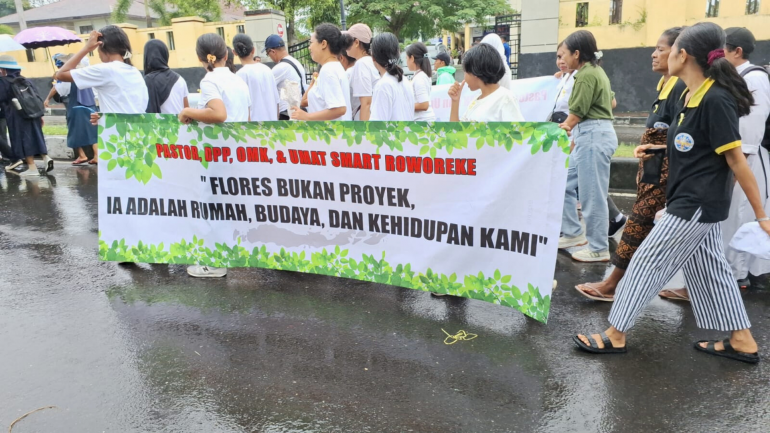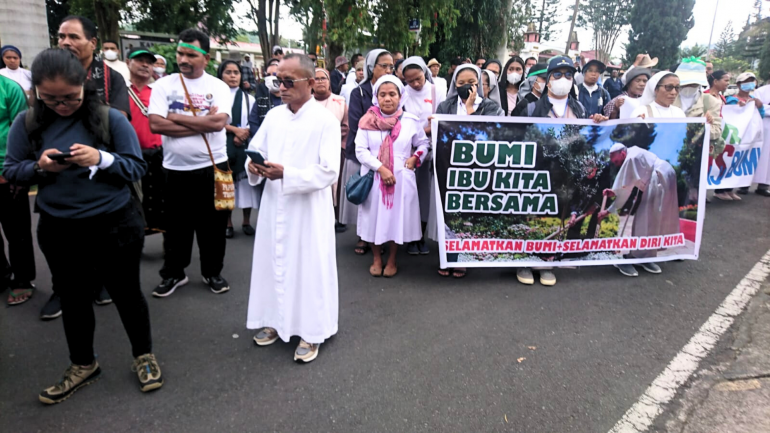Church and Civil Society Raise Prophetic Voice Against Geothermal Push in Indonesia
As tensions rise over geothermal energy development on the island of Flores, the Catholic Church in Indonesia has once again joined hands with local communities and civil society in a united, prayerful stand to protect both people and creation.
More than a policy dispute, this resistance has become a testimony of faith voice from the margins, urging the world to reconsider the true meaning of progress.
In a recent interview with RVA News, Archbishop Paulus Budi Kleden, SVD, Metropolitan Archbishop of Ende, reaffirmed the Church’s opposition to geothermal projects in Sokoria and Mataloko. He clarified that this stance is not political but pastoral, a response to “the cry of the earth and the cry of the poor,” and a defense of life in all its forms.
“These projects may bring electricity,” Archbishop Kleden said, “but at what cost? When development displaces families, dries up water sources, and violates cultural values, we must ask: Whom does it serve? This is not just about energy. It is about life, justice, and the future of our people.”
On the ground, the struggle is palpable. In Mataloko, communities face a painful choice between temporary jobs in geothermal operations and long-standing traditions rooted in their land and faith. For many, promises of development have come with uncertainty and fear.
The Archbishop acknowledged the importance of renewable energy in today’s world but warned it must not come at the expense of human dignity and ecological harmony. “Flores is not a void to be filled,” he said. “It is a land with memory, spirit, and community. In this context, geothermal energy risks becoming a quiet form of dispossession.”
Instead, the Archdiocese is advocating for sustainable alternatives. Solar power, for example, is already being explored in Maumere in collaboration with the French government. Archbishop Kleden cited this as a model that respects both the island’s environment and its cultural fabric. “We are not rejecting progress,” he explained. “We are inviting discernment.”
This call is echoed by grassroots movements such as the Aliansi TERLIBAT Bersama Korban Geothermal Flores (ALTER BKGF), a coalition of farmers, elders, youth, and faith groups. They have raised alarms over environmental damage, sulfuric gas emissions, cracked farmland, and health issues such as skin disease. They accuse developers of disregarding customary land rights and excluding affected communities from meaningful dialogue.
A recent coordination meeting led by Governor Melkiades Laka Lena, intended to solicit public input, was criticized as performative. Activists said testimonies from directly affected villages like Wogo, where seismic disturbances and toxic fumes have been reported, were ignored or excluded. “We are invited to the table, but not allowed to speak,” said one local leader.
The Flores resistance deeply resonates with the vision of Laudato Si’, Pope Francis’s encyclical on the care of our common home. The Archdiocese of Ende continues to promote an “integral ecology” that defends both creation and communities, especially the poor and voiceless.
“We are not anti-technology,” Archbishop Kleden emphasized. “But we are disciples of Christ, and our mission is clear: to protect life, to stand with the poor, and to care for the earth entrusted to us.”
At the national level, the Indonesian government’s energy roadmap brands Flores as a “Geothermal Island”, contributing to its ambitious 35,000-megawatt target. But on the ground, this has brought division and unrest. In Poco Leok, West Flores, 17 villagers face legal action for opposing geothermal activities. Human rights groups report incidents of intimidation and forced confessions from traditional leaders, deepening the sense of exclusion and injustice.
In response, the Flores-Lembata Citizens’ Coalition released a poignant statement, “We are not enemies of progress. But do not call it development if it poisons our rivers and tears apart our homes. We seek not confrontation, but protection, of our land, our water, and our children’s future.”
For the Church, this is more than an environmental issue; it is a moral imperative. It is a call to accompany the suffering, defend creation as a sacred gift, and bear prophetic witness against systems that prioritize profit over people.
In Flores, the Church’s voice is not one of protest alone; it is a voice of hope, inviting the world to reimagine progress through the lens of compassion, justice, and care for the most vulnerable.










